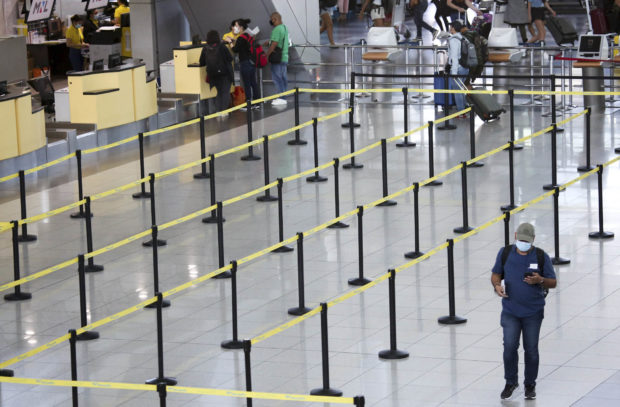IATF: Foreigners entering PH need proof of full vaccination

FILE PHOTO: Empty passenger lanes at Ninoy Aquino International Airport’s Terminal 3. (Photo by LYN RILLON / Philippine Daily Inquirer)
Beginning Feb. 16, foreign nationals entering the country must show proof of full vaccination against COVID-19, according to the government’s pandemic task force.
The Inter-Agency Task Force for the Management of Emerging Infectious Diseases (IATF) also requires all international travelers to present a negative reverse transcription-polymerase chain reaction (RT-PCR) test taken within 48 hours prior to departure from their country of origin.
Only a limited number of foreigners have been allowed here so far and foreign tourists are still barred from entering the country.
Among those allowed entry are foreign nationals with long-term visas as well as the foreign spouses and children accompanying Filipinos.
They would be considered fully vaccinated at least two weeks after receiving a second dose in a two-dose series, or at least two weeks after receiving a single-dose vaccine, the IATF said.
Article continues after this advertisementThe vaccines administered must have any of the following criteria: inclusion in the emergency use listing of the World Health Organization (WHO) or emergency use authorization list of the Food and Drug Administration, or issuance of a compassionate special permit from that agency.
Article continues after this advertisementForeigners could present as proof of vaccination a WHO International Certificate of Vaccination and Prophylaxis, a VaxCertPH certificate, or a digital certificate issued by a foreign government which has accepted VaxCertPH under a reciprocal arrangement. That certificate may also be deemed valid if it is already recognized by the IATF.
Exceptions to presenting proof of full vaccination are passengers below 18 years old, those medically unable to receive a vaccine as certified by a competent public health authority, and foreign diplomats and their qualified dependents.
Red-list countries
The IATF said the Department of Transportation had advised airlines to require foreign nationals traveling to the Philippines to show proof of vaccination before boarding their flights.
The task force has lifted the restriction on the entry of travelers from red-list countries, or those at high risk for COVID-19, but would require them to undergo mandatory quarantine upon arrival.
Under the previous rules, travelers from red-list countries were barred entry except for Filipinos arriving via repatriation flights.
Now these passengers may be allowed entry if they flew out of those destinations within the last 14 days before their arrival here.
Those who are fully vaccinated will be placed on facility quarantine upon arrival and administered an RT-PCR test on the seventh day of quarantine.
They may be released upon testing negative, but must continue home isolation up to the 14th day from their arrival.
Passengers who are unvaccinated, partially vaccinated, or whose vaccination status cannot be validated may be discharged from facility quarantine upon completing 10 days, regardless of the results of their RT-PCR tests which will be administered on their seventh day.
They will will be on home quarantine up to their 14th day from arrival.
Countries and territories in the red list from Jan. 16 to Jan. 31 are Saudi Arabia, Canada, Antigua and Barbuda, Curacao, Malta, Puerto Rico, Spain, Aruba, French Guiana, Mayotte, the US Virgin Islands, Iceland, Mozambique and Somalia.
Yellow, green lists
Travelers from yellow-list, or moderate-risk countries, including the United States, will be directed to a facility-based quarantine with an RT-PCR test on the fifth day. They could be released after testing negative but will complete home quarantine for two more days.
Those who are unvaccinated, partially vaccinated, or whose vaccination status cannot be validated will be tested on the seventh day while under facility quarantine. After testing negative they will proceed to home quarantine up to their 14th day.
Fully vaccinated travelers from green-list, or low-risk countries will be spared facility quarantine, but should monitor themselves for symptoms for seven days.
The unvaccinated and partially vaccinated, as well as passengers whose vaccination status cannot be validated will be on facility quarantine until the release of their negative RT-PCR test on the fifth day, after which they must observe themselves for symptoms until their 14th day.
The green-list countries from Jan. 16 to Jan. 31 are Bangladesh, Benin, Bhutan, the British Virgin Islands, China, Ivory Coast, Djibouti, Equatorial Guinea, Falkland Islands (Malvinas), The Gambia, Ghana, Guinea, Hong Kong, India, Indonesia, Japan, Kosovo, Kyrgyzstan, Montserrat, Morocco, Niger, Oman, Pakistan, Paraguay, Saba, Saint Barthelemy, Senegal, Sierra Leone, Sint Eustatius, Taiwan, Timor-Leste and Uganda.
The IATF said negative RT-PCR tests taken within 72 hours before a passenger’s departure from the country of origin would be honored until 12:01 a.m. of Jan. 19.
Meanwhile, the task force adopted a recommendation by the Department of Tourism to allow quarantine hotels to serve as isolation facilities as well.
These hotels would be subject to protocols issued by the Bureau of Quarantine and the Department of Health.
Nograles said this meant that returning Filipinos who test positive for COVID-19 while on quarantine need not move to another facility, as they could carry on their isolation in the hotel where they are staying.